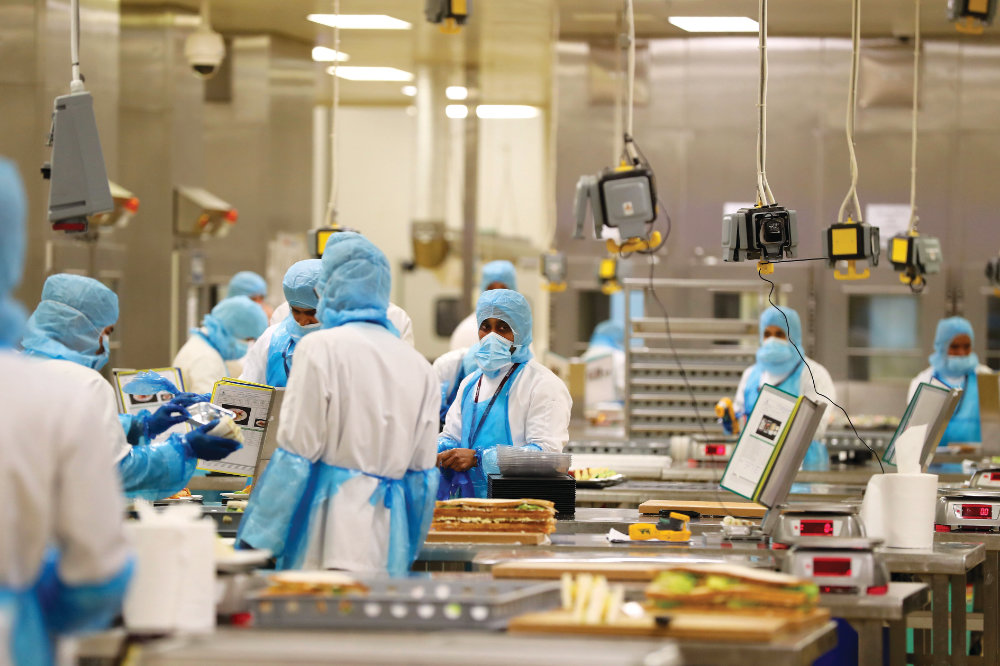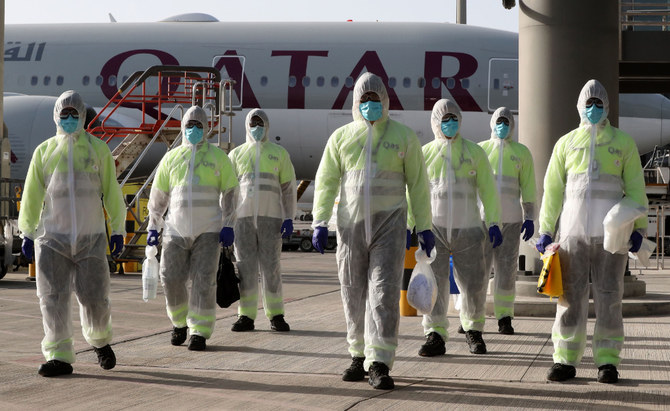DUBAI: For as long as he lived in Qatar, Antony, from Batticaloa in Sri Lanka, led a sort of double life.
By day, he was a cleaner at the gleaming offices of Qatar Foundation and Qatar National Convention Center in north Doha.
By night, he was a miserable occupant of a cramped room in a derelict building in the Industrial Area, a sprawling expanse of workers’ accommodation, warehouses, vehicle-repair shops and factories, known locally as Sanaya.
Looking back, Antony can be excused for believing that it was destiny that brought him back to Sri Lanka a few months ago. Many of his former dormitory mates and co-workers now find themselves in a virtual prison, sealed off inside the Industrial Area by Qatari internal security following the coronavirus outbreak in the country.
Residents of Doha know there is only one way to describe what has been unfolding in the slumlike neighborhood: A man-made tragedy.
Qatar has been engaged in a damage-control exercise since March 11, when it enforced a strict lockdown of the Industrial Area after the Ministry of Public Health said that 238 new cases had been discovered among people “who reside in one residential complex.”
Still, scrutiny of Qatar’s treatment of migrant workers has intensified. In an open letter to Sheikh Khalid bin Khalifa bin Abdulaziz, Qatar’s prime minister, on March 31, 16 nongovernmental organizations and trade unions jointly called for adequate protection of the workforce.
The coalition, which includes Human Rights Watch, Amnesty International and Migrant Rights.org, has asked Doha to supplement steps already taken with “further actions that protect public health and are consistent with fundamental human rights, including the principle of non-discrimination.”
It said: “Qatari authorities should, among other recommendations, ensure that all migrant workers, including undocumented workers, quarantined or otherwise, have access to testing and get appropriate medical treatment.”
Until February, the world had heard little about what Qatari authorities described euphemistically as “one residential complex” — an overcrowded shantytown in which most of Qatar’s low-income expatriate workforce is housed.
The abject squalor of the Industrial Area has long been an open secret in the wealthy, gas-rich country, but its remote location meant it was safely out of the sight of journalists on all-expenses-paid Qatar tours and visiting officials of international organizations.
Now, with possibly thousands of workers infected with the coronavirus and the entire district under strict lockdown, the public-health crisis has become yet another blot on Qatar’s reputation — and a stain on the Arab world’s collective conscience.
A diplomatic source said: “The situation (as of Friday) is under control, but not entirely. There are serious restrictions on workers’ movement.”
A March 20 report in the UK’s Guardian newspaper said: “No one can enter or leave, say workers who live in the area. Inside the quarantined camps, workers describe an atmosphere of fear and uncertainty.”
Citing sources inside the Industrial Area, the newspaper said that some workers were being put on unpaid leave until further notice, with only food and accommodation covered.
“The situation is getting worse each day. Workers from camp 1 to camp 32 are in lockdown. My friends who live there are in extreme panic,” one worker from Bangladesh told the Guardian.
The AFP news agency quoted a Pakistani resident, who was beginning a second week under mandatory quarantine, as saying: “We’ve been in lockdown for the last eight to 10 days, and we don’t know when it will end.
“The basic issue we are facing now is groceries. The government is providing us with food, but only after some days — and little things only.”
There are an estimated 2 million migrant workers in Qatar, mostly from South Asia and East Africa. They account for 95 percent of the country’s working population.
This segment of the population has swelled in recent years as the Gulf state pumps billions of dollars into the construction sector as the host of the FIFA World Cup in 2022.
Human-rights organizations have repeatedly criticized labor practices in Qatar, particularly since it began importing armies of impoverished workers to build a new rapid transit system and a string of football stadiums among other trophy projects.
Except for the few months of the year when the weather in the country is bearable, these laborers have been toiling away day and night in sweltering heat at different project sites, most located miles from their grim bedroom community — the Industrial Area.
For a long time, the entire neighborhood resembled the set of “District 9,” a 2009 film about a fictional internment camp in South Africa in which a population of sick and malnourished aliens is forced to live in pathetic conditions on Earth.
It was obvious that the rulers of Qatar had no shortage of funds when it came to investing in high-return diplomatic initiatives, bidding for prestigious sports events, or bankrolling fellow Islamists across the Middle East.
Yet, when it came to its own backyard, namely its wretched labor camps, there seemed inexplicably to be insufficient gas wealth to make these sites merely inhabitable.
Opinion
This section contains relevant reference points, placed in (Opinion field)
In recent years, the approach roads to the Industrial Area have become more navigable with the completion of a number of highways among other infrastructure projects. But such improvements have made little difference to the lives of the construction workers themselves.
The streets have potholes so large that motorists can be excused for thinking they are not in the world’s richest country on a per capita basis, but in a strange, benighted land.
The same streets are also lined with shabby dormitories, where laborers live often crammed 10 to a room, and sharing kitchens and toilets in unsanitary conditions.
Practices such as “social distancing” and self-isolating — essential precautions to prevent the spread of any infectious disease — are impossible in such surroundings.
Street lighting is so inadequate and the dust stirred up by passing vehicles so thick that venturing into the Industrial Area at night has never been for the faint of heart, especially if the visitor is from one of Doha’s upmarket neighborhoods just a few miles away — West Bay, Lusail or Pearl Qatar, the artificial island.
Even before the new coronavirus appeared as a menace to the Industrial Area’s residents, unnatural death was far from a rare occurrence, especially during the Gulf state’s long, hot summer.

Migrant workers, on whom Qatar is heavily reliant, are bearing the brunt of a coronavirus outbreak. (AFP)
Hundreds of thousands of laborers have been exposed to potentially fatal levels of heat stress while working in temperatures of up to 45 C for up to 10 hours a day.
Since high temperatures have an adverse effect on the cardiovascular system, medical experts believe there is a direct correlation between the abnormally high fatality rates among workers and heat stress in the summer months.
Data from the Indian government showed that 1,678 of its citizens died in Qatar between 2012 and August 2018.
Between 2012 and 2017, at least 1,025 Nepalis died in Qatar from cardiac arrest, respiratory failure and “sickness” among other causes.
According to reports, in most cases no autopsies were performed on the bodies of migrant workers, whose deaths were attributed to cardiovascular or “natural” causes.
Paradoxically, for all the international scrutiny that the Industrial Area’s coronavirus outbreak is drawing, repercussions of the global pandemic could leave Qatar’s migrant workers even more vulnerable in the coming days.
According to International Labor Organization estimates, the predicted economic and labor crisis could increase unemployment worldwide by almost 25 million.
For Antony, the one-time Industrial Area resident, returning to Sri Lanka had been a wrenching decision given the limited job prospects for an unskilled worker. But with the benefit of hindsight, he has absolutely no regrets.




















